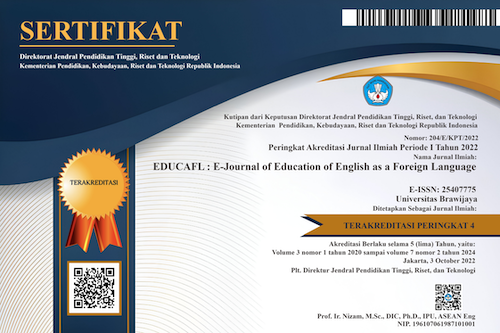Debate Technique as Teacher's Strategies in Improving Student’s Higher Education English Speaking Skill
DOI:
https://doi.org/10.21776/ub.Educafl.2018.001.02.02Keywords:
speaking skill, teaching strategies, debate technique, students higher educationAbstract
Speaking is not only used in public forum but also anytime and anywhere. Speaking also required proficiency in order to make communication clearly. The biggest fear of a student is when they have to speak in public, therefore the lecturer’s willingness to develop the speaking skill for students become very important, it accompanied by strategies that can make students become more courageous to speak in public. To improve the student’s proficiency, teacher needs different strategies based on the skill's differences, such as speaking skill, reading skill and writing skill. Thereby, the different skills required different strategies in order to achieve the different goals and the expected results. This article uses descriptive qualitative as the method in collecting the data. Descriptive qualitative method is used to make a systematic, factual and accurate description, description, or painting of the facts, properties and relationships among the phenomena investigated in terms of words instead of statistics. The result reveals that the excellent score obtained by the students in the vocabulary. The lowest score obtained by the students is in the content of the structure which is the hardest problem that often faced by the higher education students. Moreover, the utilization of this debate technique is effective in order to improve the higher student English speaking skillReferences
Bellon, Joe. (2000). A Research-based Justification for debate Across the Curriculum. Atlanta: Georgia State University
Ciprianova, E. & Vanco, M. (2010). English the Age of Globalization: Change ELT Models, Restructuring Relationships. JoLIE 3, pp. 123-208.
Cole, R. W. (2008). Educating Everybody’s Children: Diverse Teaching Strategies for Diverse Learners (revised). ASCD.
Lapak Ponsel. (2020). Lapak Ponsel - Situs Informasi Terkini Tentang Gadget Dan Tekno. [online] Available at: https://www.lapakponsel.my.id/ [Accessed 12 Jan. 2020].
Dundes, L. (2001). Small group debates: Fostering critical thinking in oral presentations with maximal class involvement. Teaching Sociology, 29(2), 237–243.
Hawkes, T. (2016). Ten Leadership Lessons You Must Teach Your Teenager. UK: Hachette.
Herrera, S. G. (2015). Biography-Driven Culturally Responsive Teaching (illustrate). Teachers College Press.
Kroeker, R. H. (2009). The reality of english conversation classes: a study in a south korean university. University of Birmingham.
Kuśnierek, A. (2015). Developing students’ speaking skills through role-play. World Scientific News, 7, 73–111.
Liu, T. Y. (2009). A contextâ€aware ubiquitous learning environment for language listening and speaking. Journal of Computer Assisted Learning, 6(25), 515–527.
Maryadi, A. (2008). Implementing Debate di Sekolah. Jakarta: RinekaCipta
Nunan, D. (1999). Second language teaching and learning. Boston: Heinle and Heinle Publishers.
Oduke, O. (2014). Learning French oral skills using role play as a learning strategy: The kenyan experience. Anchor Academic Publishing (aap_verlag).
Quinn, S. (2009). Debating in the World Schools Style: A Guide. IDEA.
Sellnow, Deanna. 2004. Confident Public Speaking. USA: Thomson Wadsworth
S. Sabbah. 2015. The Effectiveness of Using Debates in Developing Speaking Skills among English Majors at University of Palestine. Gaza: Al- Azhar University
Thornbury, S. and Slade, D. (2006). Conversation: from description to pedagogy. Cambridge: Cambridge University Press.
Van Lier, L. (1989). ‘Reeling, writhing, drawling, stretching, and fainting in coils: Oral proficiency interviews as conversation.’ TESOL Quarterly 23(3), 689-508.
Zhang, X., & Head, K. (2009). Dealing with learner reticence in the speaking class. ELT journal, 64(1), 1-9.
Downloads
Published
Issue
Section
License
Authors who publish with this journal agree to the following terms:
- Authors retain copyright and grant the journal right of first publication with the work simultaneously licensed under a Creative Commons Attribution License that allows others to share the work with an acknowledgement of the work's authorship and initial publication in this journal.
- Authors are able to enter into separate, additional contractual arrangements for the non-exclusive distribution of the journal's published version of the work (e.g., post it to an institutional repository or publish it in a book), with an acknowledgement of its initial publication in this journal.
- Authors are permitted and encouraged to post their work online (e.g., in institutional repositories or on their website) prior to and during the submission process, as it can lead to productive exchanges, as well as earlier and greater citation of published work (See The Effect of Open Access).



